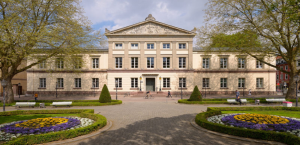The Legacy of the University of Göttingen: A Beacon of Academic Excellence
Nestled in the heart of Germany, the University of Göttingen stands as a testament to centuries of intellectual pursuit and academic rigor. Established in 1734, this venerable institution has etched its name in the annals of history as a cradle of knowledge, a hub of innovation, and a beacon of academic excellence. Over its long and illustrious journey, the university has shaped the minds of countless scholars, produced pioneering research, and contributed significantly to the advancement of human understanding across a myriad of disciplines.
Historical Roots and Academic Tradition
The University of Göttingen was founded during the Age of Enlightenment, a period marked by a fervent quest for knowledge and a spirit of intellectual curiosity. Conceived under the patronage of King George II of England and Elector of Hanover, it was intended to be a bastion of academic freedom and inquiry. From its inception, the university embodied the principles of open discourse, scholarly debate, and the pursuit of truth—a tradition that continues to define its ethos to this day.
One of the university’s most illustrious chapters unfolded during the 19th century, often referred to as its “Golden Age.” It was during this period that Göttingen emerged as a leading center of mathematical and scientific research in Europe. The names of luminaries such as Carl Friedrich Gauss, the “Prince of Mathematicians,” and Wilhelm Weber, the co-founder of electromagnetic theory, became synonymous with the institution. Their groundbreaking work in mathematics, physics, and astronomy not only garnered international acclaim but also laid the foundation for modern scientific inquiry.
Pioneering Research and Academic Excellence
The University of Göttingen boasts a rich legacy of pioneering research that has left an indelible mark on various fields of study. In the realm of mathematics, the contributions of Gauss reverberate through the corridors of academia to this day. His work on number theory, the method of least squares, and the discovery of the Gaussian distribution revolutionized the field, earning him the title of the “Princeps mathematicorum” (the Prince of Mathematicians).
The influence of Göttingen’s scholars extended beyond mathematics, encompassing a diverse array of disciplines. In physics, the collaboration between Weber and Gauss led to groundbreaking discoveries in electromagnetism, including the development of the first electromagnetic telegraph. The university’s physics department continued to flourish, with luminaries such as Max Born, a Nobel laureate known for his work on quantum mechanics, adding to its illustrious history.
The humanities and social sciences also found fertile ground at Göttingen, with scholars like Wilhelm Dilthey pioneering the field of hermeneutics—the study of interpreting texts and understanding human expression. The university’s tradition of excellence in philosophy, literature, and history further enriched its academic tapestry, attracting students and scholars from around the world.
A Global Hub of Learning and Collaboration
Beyond its intellectual contributions, the University of Göttingen has long served as a global hub of learning and collaboration. Its international reputation draws students and researchers from every corner of the globe, fostering a diverse and vibrant academic community. The university’s commitment to fostering cross-cultural exchanges and interdisciplinary collaboration has led to innovative research partnerships and groundbreaking discoveries.
Göttingen’s academic programs are designed to encourage intellectual exploration and critical thinking, preparing students to tackle the complex challenges of the modern world. Whether in the natural sciences, social sciences, humanities, or engineering, students benefit from a rich academic environment that encourages both theoretical inquiry and hands-on research.
Embracing the Future: Innovation and Sustainability
As we look to the future, the University of Göttingen remains at the forefront of innovation and sustainability. With cutting-edge research initiatives in renewable energy, environmental science, and sustainable development, the university is actively engaged in addressing pressing global challenges. From pioneering advancements in green technologies to spearheading initiatives for biodiversity conservation, Göttingen continues to demonstrate its commitment to creating a better world for future generations.
In conclusion, the University of Göttingen stands as a testament to the enduring power of knowledge, the pursuit of truth, and the spirit of inquiry. From its humble beginnings in the 18th century to its current status as a world-renowned institution, Göttingen has remained true to its founding principles of academic freedom, excellence, and innovation. As we celebrate its legacy, we are reminded that its greatest achievements lie not only in the discoveries of the past but also in the promise of the future—a future shaped by the inquisitive minds and boundless curiosity nurtured within its storied halls.
With each passing year, the University of Göttingen continues to inspire generations of scholars, researchers, and thinkers, ensuring that its legacy as a beacon of academic excellence endures for centuries to come.
For more information, Visit or get in touch with our trusted study abroad consultants. International and avail our wide range of services for students on destinations like Study in UK, Study in USA, Study in New-Zealand, Study in Ireland and many other countries.



